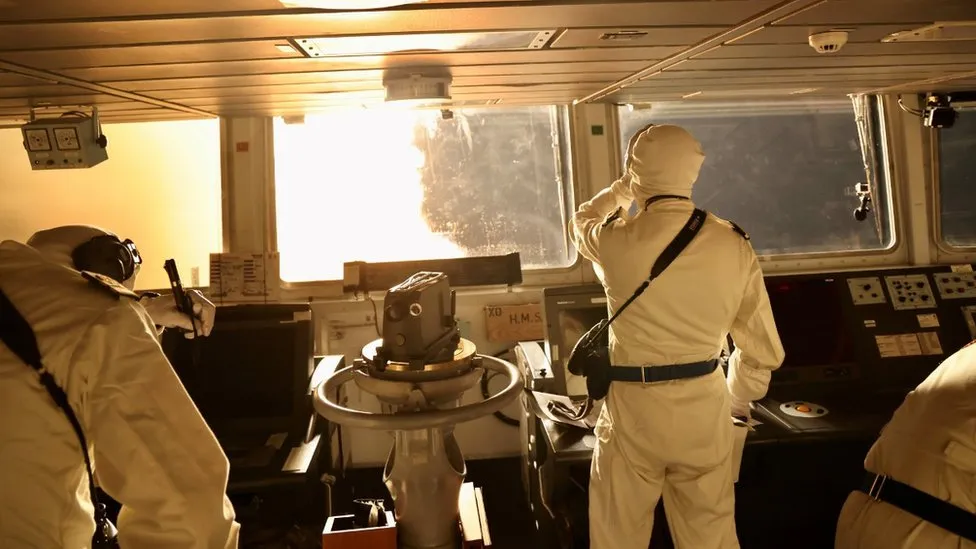UK and US naval forces have repelled the largest attack yet by Yemen's Houthi rebels on shipping in the Red Sea, the UK defence secretary says.
The Iran-backed group launched at least 21 drones and missiles overnight, according to the US military. They were shot down by carrier-based jets and four warships, it added. No injuries or damage were reported.
The Houthis have not commented, but they have targeted vessels in response to the war in the Gaza Strip. They have claimed – often falsely – that the ships were linked to Israel.
The US military's Central Command said Tuesday's attack was the 26th since 19 November.
At around 21:15 local time (18:15 GMT), Iranian-designed one-way attack drones, anti-ship cruise missiles and anti-ship ballistic missiles were launched from Houthi-controlled areas of Yemen towards international shipping lanes in the southern Red Sea, it added.
Eighteen drones, two cruise missiles and one ballistic missile were shot down by F/A-18 warplanes from the aircraft carrier USS Dwight D Eisenhower, which is deployed in the Red Sea, and by four destroyers, the USS Gravely, USS Laboon, USS Mason and HMS Diamond.
HMS Diamond shot down seven Houthi drones using its Sea Viper missiles and guns, a British defence source told the BBC. Each of the missiles costs more than £1m ($1.3m).
“The UK alongside allies have previously made clear that these illegal attacks are completely unacceptable and if continued the Houthis will bear the consequences,” UK Defence Secretary Grant Shapps warned in a statement.
“We will take the action needed to protect innocent lives and the global economy,” he added.
A week ago, the US, UK and 10 other countries – including Germany, Italy, Australia, Bahrain and Japan – issued a similar warning in a joint statement that was widely interpreted as a threat of military action against Houthi targets in Yemen, including where missiles are stored and launched.
They said the attacks posed “a direct threat to the freedom of navigation that serves as the bedrock of global trade in one of the world's most critical waterways”.
Almost 15% of global seaborne trade passes through the Red Sea, which is linked to the Mediterranean by the Suez canal and is the shortest shipping route between Europe and Asia. The fear is that fuel prices will rise and supply chains will be damaged.
The International Chamber of Shipping says 20% of the world's container ships are now avoiding the Red Sea and using the much longer route around the southern tip of Africa instead.
The Houthis say they have been targeting Israeli-owned or Israel-bound vessels to show their support for the Iran-backed Palestinian group Hamas since the start of the war in Gaza in October.
On Friday, the foreign ministry of the Houthi-run government in Sanaa rejected the Western allies' statement and insisted navigation was “totally safe” in the Red Sea “except for ships headed for ports in occupied Palestine”.
“This is a humanitarian measure in the wake of the barbaric practices committed by the Zionist entity [Israel] against civilians in Gaza,” it said, adding that the stance would not change “until the lifting of the savage siege” of the Palestinian territory.
Formally known as the Ansar Allah (Partisans of God), the Houthis began as a movement that championed Yemen's Zaidi Shia Muslim minority.
In the early 2000s, they fought a series of rebellions against the Yemeni government in a bid to win greater autonomy for their northern heartland on the border with Saudi Arabia.
In 2014, the Houthis took control of the capital, Sanaa. They seized large parts of western Yemen the following year, prompting a Saudi-led coalition to intervene in support of the international-recognised Yemeni government.
The ensuing war has reportedly killed more than 150,000 people and left 21 million others in need of humanitarian assistance. Saudi Arabia and the US have accused Iran of smuggling weapons, including drones and cruise and ballistic missiles, to the Houthis, in violation of a UN arms embargo. Iran has denied the allegation.
— CutC by bbc.com


